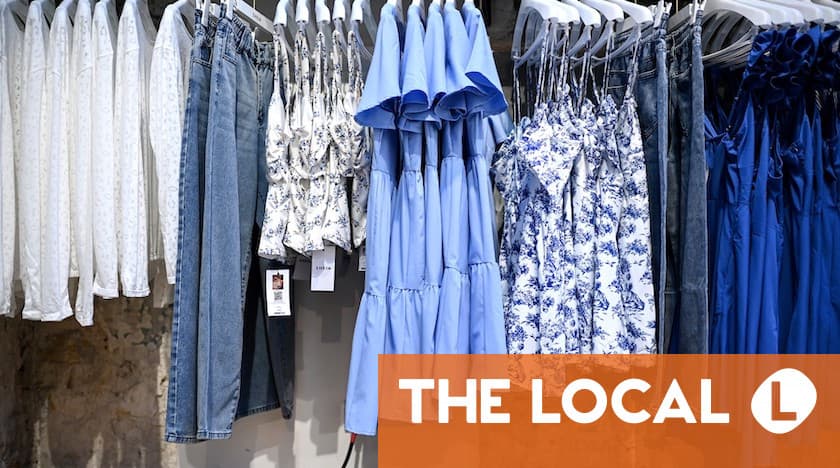
France’e environment minister Christophe Béchu has announced that the French government would support legislation to “financially penalise fast fashion”, in an effort to encourage more sustainable alternatives.
The text began to be examined in France’s Assemblée Nationale on Monday. It was tabled by Anne-Cécile Violland, an MP from Horizons, part of Macron’s centrist group, and will be debated on March 14th. After that, if the Assemblée votes in favour, it will go to the Senate.
The bill targets certain brands and online sites – including Primark, Shein and Temu – that offer low-cost, lower-quality clothing. The government is proposing financial penalties for companies that create a negative environmental impact and a ban on fast-fashion advertising.
“When we buy on these sites, we know what we are doing and we contribute to massive pollution of our environment,” Violland told France 2.
The head of France’s National Clothing Federation, Pierre Talamon, was in support of the proposal. He told Franceinfo that “we must penalise those who market overproduction, which pushes people to buy clothes and wear them seven or eight times before throwing them in the trash.”
“These online companies do not create jobs, they destroy them,” he added.
What is being proposed?
The bill would create a penalty system for fast-fashion brands, the ‘eco-contribution’ would be paid by companies on a sliding scale based on their environmental impact.
By 2030, it could reach up to €10 item sold, or 50 percent of the sale price, depending on the brand.
Advertisement
The bill doesn’t propose any minimum price for consumers, but it’s assumed that costs would be passed on to purchasers, potentially spelling the end of deals like a €3 T-shirt.
The third article of the bill would prohibit advertising for fast-fashion, similar to how France has outlawed the advertising of fossil fuels.
In terms of how this would work in practice, the bill states that guidelines would later be specified by the Conseil d’État, but Violland also referenced potentially adding messages on websites that would make consumers aware of the environmental impact of their purchases, similar to how France’s Evin Law regulates the advertising of alcoholic beverages.
So what counts as ‘fast fashion’?
The bill does not offer a formal definition of ‘fast-fashion’ and it avoids a discussion of price or labour rights, focusing primarily on waste and the environment.
The measures included in the bill designate problematic brands based on their environmental and carbon impact, as well as how often they introduce new collections and articles of clothing.
Lawmakers specifically referenced the Chinese ‘ready-to-wear’ company Shein as being at the forefront of ‘fast-fashion’ trends, which has been accused of forced labour and use of dangerous chemicals by rights advocates.
Advertisement
Noting the 7,200 new clothing options a day and 470,000 different products available to customers, French lawmakers wrote that “Shein offers 900 times more products than a traditional French retailer.”
In an interview with Le Figaro, Violland said that the “overproduction of clothing, which arrives from Asia in contravention of all environmental regulations, is dramatic. It is urgent to tackle this problem in a very concrete way.”
Why regulate fast-fashion?
The textile industry is famous for its negative effects on the environment – it is responsible for around 10 percent of global greenhouse gas emissions, according to the World Bank Group.
On top of that, the industry uses over one trillion gallons of water for dyeing garments, with one-fifth of water pollution in the world attributable to textile dyes and treatments.
According to the Guardian, “only 12 percent of material used for clothing is recycled,” with at least 92 million tonnes of textile waste created annually.
In their summary of the bill, French lawmakers wrote that “trend in the clothing sector towards ephemeral fashion, combining increased volumes with a low-price policy, is influencing consumer buying habits by creating buying impulses and a constant need for renewal, which has environmental, social and economic consequences.”
Advertisement
This echoes the results of a 2022 French study, which found that over half of consumers throw away their clothes because they are just ‘bored of them’”.
What else is France doing to combat textile waste?
As part of France’s 2020 anti-waste law, the country banned companies from destroying unsold or returned clothing. The law also prohibited destroying other items that could instead be recycled, including electronics.
Additionally, in November, the French government launched a scheme meant to encourage people to have their clothes and shoes repaired rather than throwing them away.
The scheme is meant to incentivise getting items like clothing and shoes repaired, with the hopes of cutting down on the 700,000 tonnes of clothes thrown away by French people each year, two-thirds of which ends up in landfill.
A €154 million fund set up by the French government, to cover the period from 2023-2028, will allow customers to see discounts directly on their bills.
READ MORE: How France’s clothes and shoes repair bonus works
In June 2023, the EU passed their ‘Strategy for Sustainable and Circular Textiles’, with one of the Commission’s 2030 goals being to make “‘fast fashion is out of fashion’ and for consumers to benefit longer from high quality affordable textiles”.
